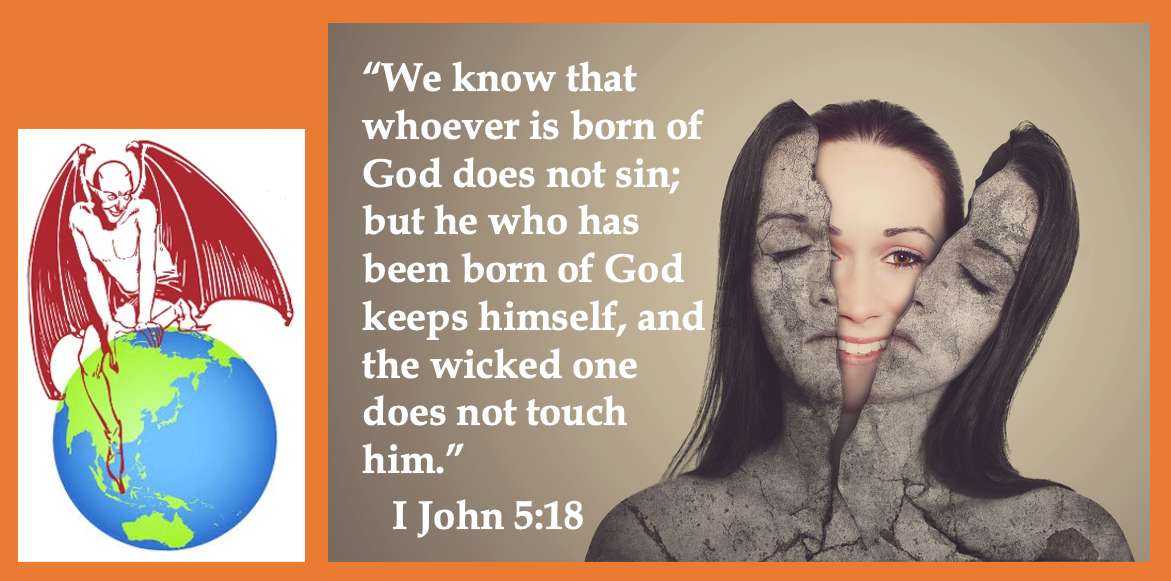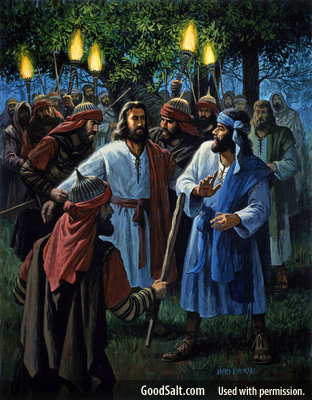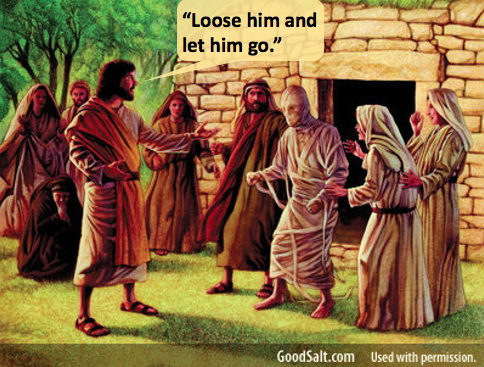“We know that whoever is born of God does not sin; but he who has been born of God keeps himself, and the wicked one does not touch him.” I John 5:18
As the apostle John concludes his letter, he reviews and reinforces truths he has shared throughout his epistle. John just focused on praying for Christian brothers and sisters who had wandered far away from God and His people on the path of sin (5:16-17). Some of these sinning believers may be close to departing from this world through a premature death (cf. Acts 5:5-10; I Cor. 3:16-17; 5:5; 11:30). 1
John’s readers (including you and me) may have wondered, “Is there any hope that these sinning believers can be restored to fellowship with God and us? Is it still possible for them to resume walking in the light of fellowship with the Lord and His people after wandering so far into darkness?”
Or maybe some of his readers were asking, “Is there any hope that I can be restored to fellowship with God after wandering aimlessly for so long in the depths of darkness? Does God still love me and want to be close to me?”
I believe the apostle John would say, “Yes, a thousand times, Yes!!!” In the next three verses John will focus on three certainties. Each of the verses in 5:18-20 begins with “We know that …” (oidamen hoti). In the New Testament the Greek word oida almost always refers to “direct insight into spiritual or divine truth” although it may not be truth that has been experienced yet. 2 “This truth is the result of the teaching and convicting ministry of the Holy Spirit.” 3 It is also important to observe that this Greek verb is in the perfect tense (oidamen) which means John and his readers knew these truths in the past and they continue to know them to the present. These are not guesses or mere human opinions, they are absolute unchanging truths from God that the apostle and his readers can be sure of no matter what they or other believers are facing or feeling.
“We know that whoever is born of God does not sin; but he who has been born of God keeps himself, and the wicked one does not touch him.” (I John 5:18). We have already learned that the phrase “whoever is born of God” refers to the divine or born-again nature we receive from God when we believe in Jesus as the Christ for everlasting life (cf. 3:9; 5:1, 13). The Greek participle translated “is born” (ho gegennēmenos) is in the perfect tense which means the new birth took place in the past and continues to the present. Since God cannot sin, the divine nature He places inside His child “does not sin” either (5:18b). A sinless Parent cannot beget a sinful child. So, sin is never an act of the born-again nature inside the believer because it is incapable of sinning (cf. 3:9).
“This divine nature is portrayed as a person (a figure of speech known as personification, that is, to treat something which is not a person as though it were, like calling a ship ‘she’). That’s why this nature is called ‘whoever,’ ‘he,’ ‘himself,’ and ‘him.’” 4
The apostle Paul spoke of this new nature as the “new man” when he writes, “And that you put on the new man which was created according to God, in true righteousness and holiness.” (Ephes. 4:24; cf. Col. 3:10). This new nature or “inner man” is strengthened by the Spirit of God (Ephes. 3:16) and has the capacity to resist the corruption and sinful lusts of this passing world which is under the control of Satan (I John 2:16-17; 5:18-19; cf. John 12:31; 16:11; 2 Cor. 4:4; Eph. 2:2; Col. 1:13a). 5
Hence, John says, “he who has been born of God keeps himself, and the wicked one does not touch him.” The word “keeps” (tēreō) means to “watch over, guard, protect, or keep unharmed.” 6 The recipient of this protection is the born-again person (“himself”).
“In saying that the regenerate inward person (cf. Rom 7:22) ‘keeps himself,’ John is not saying that one’s inner self can somehow prevent all sin in the Christian life (cf. 1:5-10). What John means is that God’s ‘seed remains in’ the regenerate inner self (cf. 3:9) as the controlling element of his born-again nature and is impervious to even the slightest contamination from the wicked one. Believers’ failures are due to the sinful ‘programming’ of their earthly bodies, as Paul himself taught in Rom 7:7-25.” 7
Even though Satan uses the lust of the flesh, the lust of the eyes, and the pride of life to sway believers away from God (2:16; 5:19), John assures us “the wicked one does not touch him,” that is, the born-again self (5:18c). The word “touch” (haptetai) means “to touch with the purpose of harming, to injure.” 8 Satan and the world he controls, cannot harm the born-again self.
This is important for all of us to remember about ourselves or other believers when humbled by sinful failures. The evil one would like to trick us into thinking that a Christian who continually walks in the darkness or repeatedly struggles with the same sin is not really God’s child which can lead them to more sinful failures. The Bible tells us we act in the way we perceive ourselves to be. “For as he thinks in his heart, so is he.” (Prov. 23:7). If I am convinced I am not really saved because of my repeated failures, then I will be more inclined to live like a nonbeliever.
But if we know and embrace the truth found in I John 5:18, we can avoid the devil’s deception, and rise from our confession of sin to the Lord (I John 1:9), knowing we are the same inwardly holy children of God we were before we sinned. So, whatever we or another Christian have succumbed to in the world, John wants us to know that who we are at the core of our being has not changed. We are still a holy child of God because God’s sinless seed remains in us (3:9).
Zane Hodges says it like this: “At the very moment we are most humbled by our sinful failures, and when we confess them, it is helpful to be confident that those failures have not really changed what we are as children of God. The enemy, try as he might, cannot really touch us. He can only attempt to persuade us that he can or has. But if we know the truth stated in this verse, he will not be able to deceive us. For if we let him, Satan will use our failures to lead us to further failure. So, after every sin, deeply though we may and should regret it, we ought to rise from our confession to God knowing that we are the same inwardly holy persons we were before we failed!” 9
Some of you reading this may have a Christian spouse or child who has pursued the lusts of this passing world (2:16-17). They have been so twisted by the godless values of this world system that they are doing things that violate their Christian beliefs and values. Perhaps they have succumbed to the allurement of alcohol, drugs, gambling, materialism, pornography, or sex. Or maybe they have developed an acute mental condition such as severe depression or a phobia. They are in bondage to such things. Please do not give up or lose hope.
If your spouse or child is a believer in Jesus Christ, he or she is still a child of God at the core of his or her being and cannot be touched or harmed by evil or the evil one (I John 5:18; cf. 3:6-9). The “seed” or divine nature of God within him or her remains unchanged. It cannot be altered or even tempted. It remains a base from which the Holy Spirit can work within this loved one to bring healing to him or her, and to bring them back to fellowship with God and His people. 10 As long as that seed remains (and it will), “it can be watered by your prayers. As long as that seed remains, it can still grow. As long as that seed remains, it can blossom, and eternal fruit can be born. Do not give up.” 11
The restoration of fellowship for wayward Christians is based on walking in the Spirit, relying on Him to express God’s sinless born-again nature in them (I John 3:6-9; 5:18; cf. Gal. 5:16-25). It is not based on willful determination, on keeping New Year’s resolutions, or the power of positive thinking. 12
But it doesn’t stop there. Not only does a child of God have God’s sinless seed that remains in him or her, but he or she is also on God’s side and God is on their side. 13 He has not given up on them. “We know that we are of God, and the whole world lies under the sway of the wicked one.” (I John 5:19). Again, John begins with “we know that…” (oidamen hoti) to convey the absolute certainty of what he is about to say. This is not mere speculation; it is absolute truth.
The phrase “of God” (ek tou Theou) refers to being on God’s side in I John. 14
“To be ‘of’ something in 1 John is to be on the side of the something. We saw this in 1 John 3:10b, 19 and 4:4. In reference to believers it means to have a dynamic, spiritual link to God, Who is obviously capable of giving us victory over the world. To be ‘of God’ means we are on His side, and He is on our side. The world lies like a limp puppet in the lap of the evil one, ready to be filled with his power. On the other side, we lie in the lap of the Lord, ready to be filled with His power.” 15
The phrase “the whole world lies under the sway of the wicked one” (ho kosmos holos en tō ponerō keitai) “suggests that the world passively rests within Satan’s operative sphere. By contrast, the phrase ek Theou (‘of God’) means being ‘from’ God. The Christian should be aware of his own sinless inward man (5:18), and he should also be aware of his utter separateness from the whole world that lives under Satan’s sway. Believers, whom the enemy cannot ‘touch’ (5:18), are not a part of the world, which lies passively in the wicked one. Thus, believers must not ‘love the world or the things in the world’ (2:15-17) and they must resist the ideas that the world promotes (cf. 2:18-19).” 16
John wants to “reinforce the readers’ consciousness that they are distinct from the satanically controlled world system and basically free from its power. They need not listen to the worldly ideas advanced by the antichrists (3:7-8). Nor need they succumb to worldly desires (cf. 2:15-17).” 17
Since a believer’s regenerate self (3:9; 5:18) and conduct is sourced in God and is free from the power of Satan and his world system (5:19), there is still hope for a Christian who has been in bondage to sin for a prolonged time. Hence, if your Christian spouse or child has been living like the devil, please know that they do not belong to the evil one nor his world system.
What this means is your sinning Christian spouse or child does not belong to Satan’s world, and he or she will always to some degree feel like a foreigner in this world system. Your loved one will never feel completely comfortable in this sin-sick world. This world is not a Christian’s home, we are just passing through; our home is way out there, somewhere beyond the blue. The child of God who wanders about aimlessly in darkness will always have a degree of discomfort. They will always know something is wrong, something just isn’t right. This is not who I am in Christ.
The good news is God can turn discomfort into disgust. When your loved one’s discomfort turns to disgust, he or she will turn towards home (God). Regardless of what this person tells you, if he or she gets sucked into the sewer of this world system, they are acting out of character, and they will never be completely comfortable. Don’t listen to their lies. Keep praying that their discomfort will turn to disgust, and God will restore them back to fellowship with Him. When they finally realize that they are wasting their life eating slop with the pigs in the pig sty, they will turn their eyes toward home (cf. Luke 15:13-17).
Because of God’s seed within your believing spouse or child, he or she is on God’s side whether they consciously sense that or not, and they will feel like a foreigner in this world. God can turn this discomfort into disgust so that they will want to come home to fellowship with Him and His family. Next time, Lord willing, we will discover how to get there. 18
Prayer: Gracious Father in heaven, oh how we needed to hear these encouraging words about Christians who are living in the depths of darkness and appear to have no hope of returning to fellowship with You and Your people. Thank You for reminding us that no matter how much we or our loved ones have embraced the lusts of this passing world, if we or they are a believer in Jesus, Your sinless nature remains inside us and is not touched by evil or the evil one. We are still children of God at the core of our being, and to some degree there will be discomfort with our sinful lifestyle and choices. Please oh Lord, turn this discomfort to disgust so all of us living in the darkness will return home to fellowship with You and Your people. Help us to rely on Your Holy Spirit for the power to live out these unchanging truths in our daily Christian lives. In the mighty name of the Lord Jesus Christ, we pray. Amen.
ENDNOTES:
1. David R. Anderson, Maximum Joy: I John – Relationship or Fellowship? (Grace Theology Press, 2013 Kindle Edition), pp. 261-262.
2. Ibid., pg. 124.
3. Ibid.
4. Ibid., pg. 263.
5. Ibid.
6. Walter Bauer, A Greek-English Lexicon of the New Testament and Other Early Christian Literature: Third Edition (BDAG) revised and edited by Frederick William Danker (Chicago: University of Chicago Press, 2000 Kindle Edition), pg. 1002.
7. Zane C. Hodges; Robert Wilkin; J. Bond; Gary Derickson; Brad Doskocil; Dwight Hunt; Shawn Leach; The Grace New Testament Commentary: Revised Edition (Grace Evangelical Society, Kindle Edition, 2019), pg. 604.
8. Bauer, A Greek-English Lexicon, pg. 126.
9. Anderson, Maximum Joy, pp. 263-264 cites Zane C. Hodges, The Epistles of John: Walking in the Light of God’s Love (Irving, TX: Grace Evangelical Society, 1999), pp. 242-243.
10. Anderson, Maximum Joy, pg. 264.
11. Ibid.
12. Tony Evans, CSB Bibles by Holman, The Tony Evans Bible Commentary (B & H Publishing Group, Kindle Edition, 2019), pg. 2953.
13. Anderson, Maximum Joy, pg. 264.
14. Hodges, The Grace New Testament Commentary, pg. 604.
15. Anderson, Maximum Joy, pp. 264-265.
16. Hodges, The Grace New Testament Commentary, pg. 604.
17. Zane C. Hodges, The Bible Knowledge Commentary Epistles and Prophecy, Editors John F. Walvoord and Roy B. Zuck (David C. Cook, 2018 Kindle Edition), Kindle Location 4126.
18. The last three paragraphs are adapted from Anderson, Maximum Joy, pg. 265.








